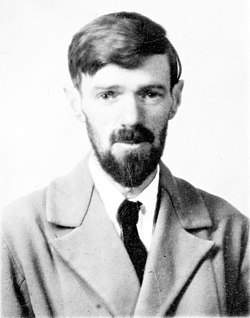D.H. Lawrence Quote
I am not a mechanism, an assembly of various sections.and it is not because the mechanism is working wrongly, that I am ill.I am ill because of wounds to the soul, to the deep emotional self,and the wounds to the soul take a long, long time, only time can helpand patience, and a certain difficult repentancelong difficult repentance, realization of life’s mistake, and the freeing oneself
D.H. Lawrence
I am not a mechanism, an assembly of various sections.and it is not because the mechanism is working wrongly, that I am ill.I am ill because of wounds to the soul, to the deep emotional self,and the wounds to the soul take a long, long time, only time can helpand patience, and a certain difficult repentancelong difficult repentance, realization of life’s mistake, and the freeing oneself
Tags:
poetry
Related Quotes
Let my silence grow with noise as pregnant mothers grow with life. Let my silence permeate these walls as sunlight permeates a home. Let the silence rise from unwatered graves and craters left by bomb...
Kamand Kojouri
Tags:
abuse, abused, activism, activism poems, activist, amnesty, bellies, bombs, broken hearts, coming together
About D.H. Lawrence
David Herbert Lawrence (11 September 1885 – 2 March 1930) was an English novelist, short story writer, poet, playwright, literary critic, travel writer, essayist, and painter. His modernist works reflect on modernity, social alienation and industrialization, while championing sexuality, vitality and instinct. Four of his most famous novels – Sons and Lovers
(1913), The Rainbow (1915), Women in Love (1920), and Lady Chatterley's Lover (1928) – were the subject of censorship trials for their radical portrayals of romance, sexuality and use of explicit language.
Lawrence's opinions and artistic preferences earned him a controversial reputation; he endured contemporary persecution and public misrepresentation of his creative work throughout his life, much of which he spent in a voluntary exile that he described as a "savage enough pilgrimage". At the time of his death, he had been variously scorned as tasteless, avant-garde, and a pornographer who had only garnered success for erotica; however, the English novelist and critic E. M. Forster, in an obituary notice, challenged this widely held view, describing him as "the greatest imaginative novelist of our generation". Later, the English literary critic F. R. Leavis also championed both his artistic integrity and his moral seriousness.
(1913), The Rainbow (1915), Women in Love (1920), and Lady Chatterley's Lover (1928) – were the subject of censorship trials for their radical portrayals of romance, sexuality and use of explicit language.
Lawrence's opinions and artistic preferences earned him a controversial reputation; he endured contemporary persecution and public misrepresentation of his creative work throughout his life, much of which he spent in a voluntary exile that he described as a "savage enough pilgrimage". At the time of his death, he had been variously scorned as tasteless, avant-garde, and a pornographer who had only garnered success for erotica; however, the English novelist and critic E. M. Forster, in an obituary notice, challenged this widely held view, describing him as "the greatest imaginative novelist of our generation". Later, the English literary critic F. R. Leavis also championed both his artistic integrity and his moral seriousness.
